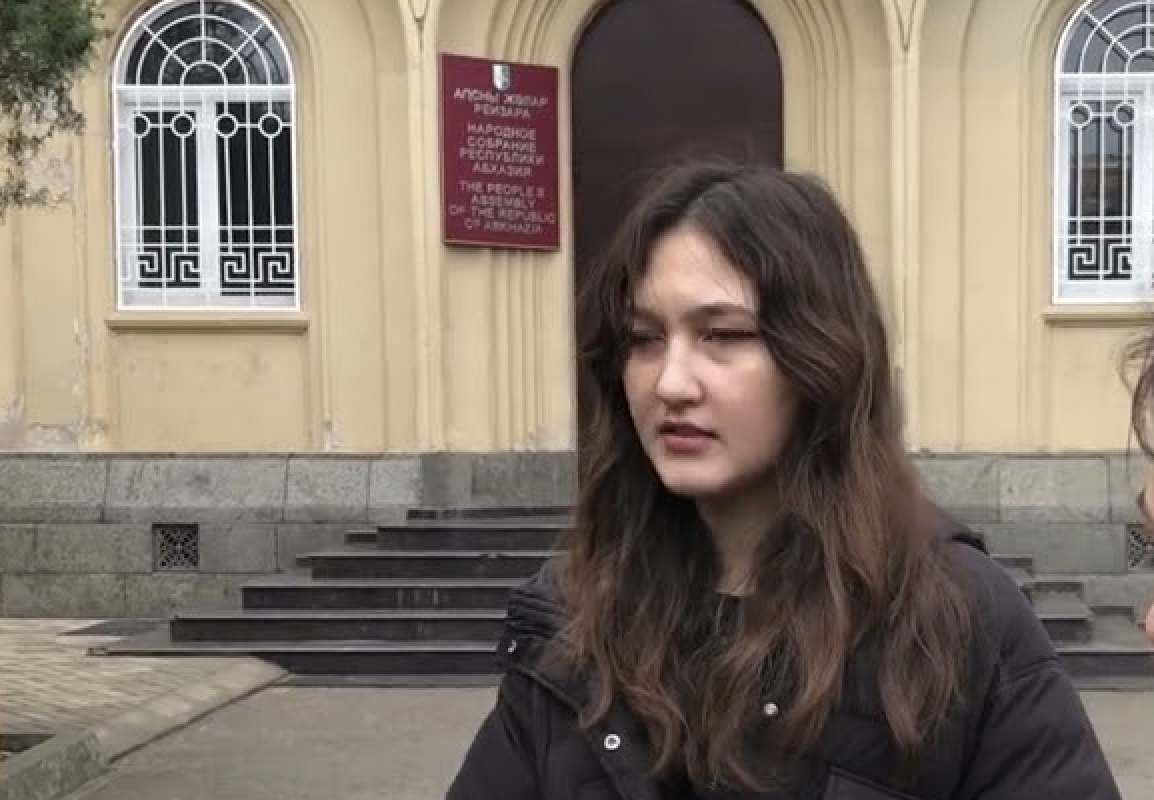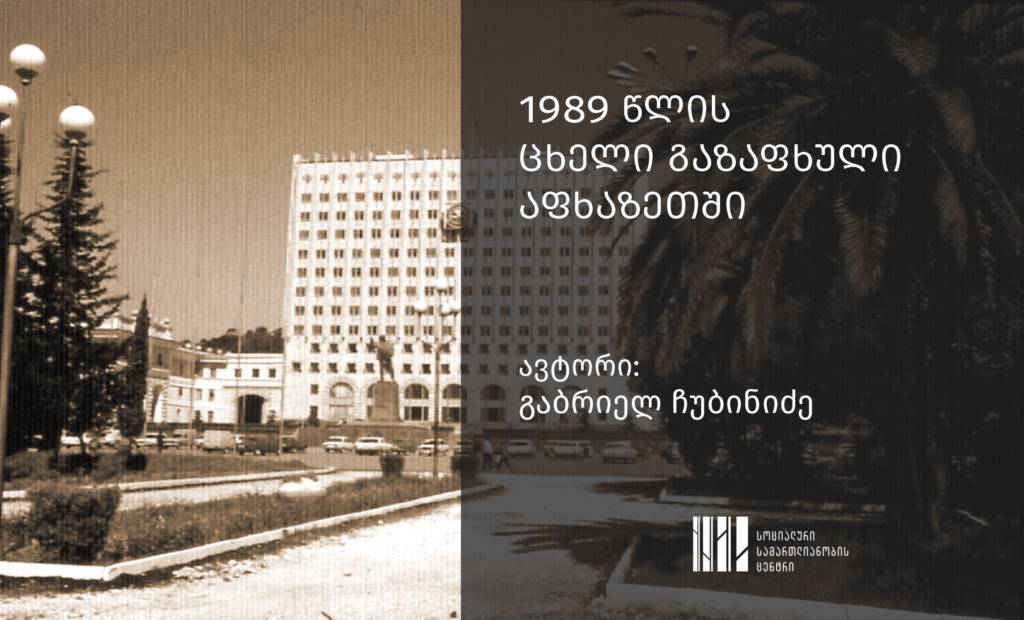Foreign Agents Law in Abkhazia
President of Abkhazia, Aslan Bzhania, has submitted a foreign agents law to parliament. Various representatives of Abkhaz society, including political experts, journalists, politicians, veterans, scientists, and artists, oppose the law. They argue that it poses a threat to Abkhazia and the freedom of its society.
In this article, we have compiled quotes from several representatives of Abkhaz society who have voiced their opposition to the law, which may be enacted in the near future:

Asida Lomiya, chairperson of the Children’s Fund of Abkhazia: “the proposed bill is unconstitutional”
“Today, they seek to dismantle us with their own hands. Threatening that the current authorities of Abkhazia will not leave a positive mark in the annals of our long-suffering people, but rather will trample upon our honor, our Constitution, and our hard-won freedom, for which the blood and tears of too many mothers have been shed. Is this truly what you desire?
In every aspect, the proposed bill is unconstitutional, as our Abkhazian Constitution guarantees freedom of expression, freedom of speech, the right to movement, the right to association, and the right to protest. “All of these fundamental rights will be erased, and we will regress to a time reminiscent of the communist era, where we were unable to openly voice our thoughts, but instead whispered them within the confines of our homes.”

Lasha Zukhba, war veteran: “this law shouldn’t even be up for consideration”
“As for the law regarding foreign agents, I firmly believe that it does not align with our Abkhazian priorities whatsoever. We have no need for such legislation. This law should not only be rejected but shouldn’t even be up for consideration. Regarding the detentions of our citizens at the border, this issue deeply concerns me.
Currently, we are in the midst of interim hearings. Yesterday, the Public Chamber conducted similar hearings with representatives of the intelligentsia, and today, with us, social activists. On Tuesday, there will be a final meeting, open to the press, where the Public Chamber will release a statement outlining their perspective, taking into account all the opinions and comments we’ve expressed.”

Said Gezerdava, lawyer: “no law that abolishes or diminishes human rights and freedoms should be ratified”
“The Constitution expressly prohibits the annulment or limitation (i.e., unacceptable restriction) of rights in any manner, particularly through legislation (Part 1, Article 35). By utilizing laws to curtail the rights of citizens, the president contravenes the Constitution on two fronts. Firstly, the president breaches the principle of the rule of law (Article 1 of the Constitution), which prohibits arbitrary decisions by officials from becoming legislative norms.
Interpreting law as an arbitrary “edict” imposed upon society, devoid of any democratic constraints (“command theory of law”), is a hallmark of authoritarian and totalitarian regimes (such as communist and fascist regimes). President Bzhania, through his actions, contributes to the establishment of bureaucratic arbitrariness as superior to the law.
Secondly, a bill of similar nature cannot be presented to the Parliament of the Republic of Abkhazia, as it fails to comply with the Constitution—no law that abolishes or diminishes human rights and freedoms should be ratified or promulgated in the Republic of Abkhazia (Article 9).”

Tengiz Dzhopua, screenwriter: “Our legislation already contains sufficient legal provisions enabling law enforcement agencies to hold individuals accountable”
“The violation of constitutional rights and freedoms of citizens is evident in this matter. Our legislation already contains sufficient legal provisions enabling law enforcement agencies to hold individuals accountable if there are other elements present in their activities. However, the manner in which this law is formulated…
It simply restricts the rights of our citizens engaged in certain types of activities. Moreover, I perceive this as merely a tool of political contention. It has been imported into Abkhazia and is being attempted to be implemented here. We have already witnessed instances where it has been actively employed.
This is essentially a means to suppress dissent, and it is unacceptable to endorse it in Abkhazia. In the post-Soviet sphere, in my view, such a law is only applicable in Russia. This bill, in my estimation, bears significant resemblance to it, with little to no distinction.”

Akhra Aristava, economist: “the law does not suit our traditional culture and the democratic principles of our people”
“In the history of Abkhazia there was no serfdom… In Abkhazia people were never branded or divided according to characteristics alien to our people. In our country, the inhabitants of the African continent who lived here also had all the rights; there is a lot of evidence of this.
And now the bill on foreign agents, which the executive branch has sent to parliament, is absolutely unacceptable and does not suit our traditional culture and the democratic principles of our people. How can one allow some Abkhaz to label other Abkhaz…”

Leuan Lagulaa, journalist, civil activist: “they want us to become idiots”
“The law catering to societal idiotism. This is precisely how I suggest we regard the law on foreign agents. Its primary objective seems to be to silence all dissent by citing connections with foreign organizations as justification.
In ancient Greece, an ‘idiot’ referred to a citizen of the polis who lived in isolation from public life, abstaining from participation in the general assembly of polis citizens and other forms of state and public democratic governance. They want us to become like such ‘idiots.’ What do we truly desire?

Leuan Mikaa, war veteran: “this legislation strips our citizens of their rights”
“We vehemently oppose the law regarding foreign agents. We haven’t even examined it clause by clause. It has been argued that this law directly contradicts the fundamental principles of our Constitution. It has been asserted that in principle, we cannot entertain a law that categorizes our people into foreign agents and other citizens.
This legislation strips our citizens of their rights and constitutes discrimination against them. We view this as a political crackdown on dissent. Both this law and the recent arrests are components of the ongoing political campaign by our government against the opposition and civil society.”

Dmitry Gvaramia, politician: “I perceive this as merely a tool of political contention”
“Violation of the constitutional rights and freedoms of citizens is evident. We already possess adequate legal norms in our legislation that empower law enforcement agencies to hold individuals accountable if other elements in their activities warrant it. However, the manner in which this law is formulated… It simply encroaches upon the rights of our citizens engaged in specific activities.
Moreover, I perceive this as merely a tool of political contention. It has been imported into Abkhazia and is being attempted to be implemented here. We have already witnessed instances where it has been actively employed. This is essentially a means to suppress dissent; it is unacceptable to endorse it in Abkhazia. In the post-Soviet sphere, in my view, such laws are only applicable in Russia. And this bill, in my estimation, bears significant resemblance to it, with little to no distinction.”

Aslan Bartsits, politician: “tomorrow, they could come for anyone”
“We emphasized that this echoes the infamous events of 1937, when servicemen, driven by ambitions for favor and promotion, caused such turmoil that innocent people suffered greatly. Today’s efforts to brand everyone as ‘foreign agents’ and ‘inciters of anti-Russian sentiments’ appear utterly crude and primitive.
Regrettably, it’s evident that the authorities are unwilling to halt their actions, regardless of protests. We fully comprehend that after targeting NGOs, all other dissenting voices critical of this government will be next. According to the bill submitted to parliament, it will take merely seconds to label someone as a foreign agent.
I hope the deputies will scrutinize this matter thoroughly and take appropriate action. However, to be frank, there has been profound disappointment since the ‘night meeting’ (when the parliament ratified the agreement on the Pitsunda state dacha). There needs to be a collective realization in society – today it’s NGOs, and tomorrow, they could come for anyone.”

Akhra Bzhania, war hero and former member of parliament: “even during intense political or social disagreements, we typically refrain from crossing the boundary of respect”
“Citizens of Abkhazia, under this bill, will be stripped of their constitutional, civil, and basic human rights. If you’re drafting such a law, why not just take away their passports! Furthermore, this bill is demeaning as it encroaches upon the moral fabric of citizens’ lives. Here in Abkhazia, such living conditions are unfamiliar to us.
It seems to me that our society is built upon mutual respect. Even during intense political or social disagreements, we typically refrain from crossing the boundary of respect and, whenever possible, show attention to others’ opinions. Yet, here, they seek to relegate these individuals to second-class citizenship.
Honestly, I harbored doubts that the president, considering everything I’ve mentioned and likely what has been conveyed to him by many others, would approve such a discriminatory law against his own citizens. I believed that only a head of state who fails to comprehend and value his own citizens would pass such legislation. However, it has been approved, serving as a sobering test for our entire society.”

Kama Argun, civil activist: “while you may find yourself in a position of power today, tomorrow these same methods could be directed back at you”
“Those who applaud the implementation of a foreign agents law today must grasp that these very mechanisms of suppression could be turned against them in the future. While you may find yourself in a position of power today, tomorrow these same methods could be directed back at you.
This pattern mirrors the Stalinist repressions, where those who initially endorsed the regime ultimately became its potential victims. Individuals who celebrated the downfall of their compatriots soon found themselves subjected to persecution. Once set in motion, such mechanisms are difficult to halt.”

Dmitry Mushba, writer: “those labeled by authorities as foreign agents will be barred from running for or holding positions in government bodies”
“According to the bill submitted by the president to parliament, citizens of Abkhazia who have any connection with international organizations are prohibited from engaging in political activity.
In essence, political activity encompasses nearly all forms of social engagement. Those labeled by authorities as foreign agents will be barred from running for or holding positions in government bodies, convening to discuss socially significant matters, contacting governmental agencies in any capacity, participating in educational activities, or even expressing their opinions publicly.
Essentially, the bill prohibits nearly everything that concerns ordinary citizens of the country. As a result, individuals falling under this provision appear to remain citizens of Abkhazia, albeit in a significantly diminished capacity, stripped of a substantial portion of their civil rights and freedoms.”

Alexandra Bargandzhia, Hara H-Pitsunda, civil activist: “Be cautious! In the pursuit of identifying foreign agents, do not discover yourselves!”
“What anti-Russian sentiments are being referenced in the highest levels of power? Not long ago, I graduated from a Russian university and lived in Moscow for four years. I regard Russia as the primary and crucial strategic partner, a guarantor of security. I acknowledge and stress the significance of bolstering this alliance.
However, following numerous arrests and encounters at the border, along with countless statements by the Ministry of Foreign Affairs, the ‘intelligentsia,’ law enforcement officials, and Aslan Georgievich, I suddenly discover that they perceived this as anti-Russian sentiment. Our aspiration is to witness Abkhazia as strong, independent, and self-sufficient. We aim to see it as a worthy partner of the Russian Federation. ‘Pro-Abkhaz’ and ‘pro-Russian’ are not mutually exclusive concepts.
Yet, the phrases so favored by this government – ‘we must share sovereignty’ and ‘without Russia, we are nothing’ – possess a clear anti-Abkhaz undertone. The repressive apparatus, built on slander, informants, provocations, etc., persistently seeks to undermine our foundation. Be cautious! In the pursuit of identifying foreign agents, do not discover yourselves!”

Mikhail Kiriya, ecologist: “A gradual ‘tightening of the screws’ is the primary condition for establishing an authoritarian regime”
“I don’t need any funding from the ‘collective West’ to comprehend the detriment of this ‘foreign agents’ law to our country. A gradual ‘tightening of the screws’ is the primary condition for establishing an authoritarian regime, with the hope that we, like frogs, will not notice and will boil in milk. I am not a politician, I don’t understand politics, and I’m not very interested in it, but I don’t require expertise to grasp the tragic consequences this law will inevitably lead to in the future.
It’s challenging to even label it as the future, but merely a period of time. We endured all this a century ago, by historical standards – it feels like yesterday. I don’t know what my great-grandfather thought about those events; he was taken away in a black car in 1931 and never returned, dying that very night. He was educated, intelligent, a family man, well-respected in his community, living modestly, yet the NKVD deemed him an enemy of the Soviet people.
There was no trial, no investigation; he simply vanished. How many similar fates befell others? How did this become possible? Were there truly no warning signs? Today, the precursor to such tragedies is this bill. Such a shameful and dreadful narrative must not be allowed to repeat itself, not even as a farce.”

Naida Abidova, Hara H-Pitsunda, civil activist: “if you allow this law to pass unchallenged, they will silence everyone”
Who does the law on foreign agents target? Believe it or not, it’s not about NGOs. NGOs are unfortunate scapegoats who operate within their cities, establishing harmless rehabilitation centers, preserving their trees, culture, and posing no harm to anyone. The law targets the brave and active individuals. Those who refuse to tolerate injustice and oppression. The city’s passionate individuals.
They are a thorn in the authorities’ side. They sacrifice their health and dedicate their lives to the noble yet perhaps naive dream of an Abkhazia that is beautiful, bright, and free. With the passing of this law, their hands will be tied. They won’t be able to create something beautiful or prevent something terrible. What can I say?
Stay home, for God’s sake. Calculate, laugh. But remember this: if you allow this law to pass unchallenged, they will silence everyone. Then, you’ll either sit and weep or rise up and resist. But it will be exceedingly difficult and painful. Are you prepared?

Daut Khutaba, MP: “this will exert a significant influence on freedom of speech”
“My stance is negative. I hold grave concerns. It appears to me that this will exert a significant influence not only on individuals associated with Western organizations but also on freedom of speech and the rights of our citizens in general.”

Kan Kvarchia, MP: “they simply want to put labels on everyone”
“The law itself, of course, has not been thoroughly studied, but we are aware of certain aspects and individual provisions. The very framing of the question, who qualifies as a foreign agent, and how they influence Abkhaz society and people’s consciousness— who conducted this analysis? Who made these determinations?
What does being a foreign agent entail? If there was such a poor understanding among us, who faced consequences for it? Or where did these alleged foreign agents undermine the foundations of our state?
Speaking figuratively, there seems to be more politics at play here. If someone disagrees or holds a different opinion from the president, they may be labeled a foreign agent, a dissenting opposition member, or something else, according to their interpretation. It appears they simply want to put labels on everyone.
When questioned, they claim it’s all against Russia, suggesting that Russia is compelling us to accept such measures… Frankly, we interact with many representatives of the Russian political elite, and while Russia is currently focused on its Northern Military District, what is the threat posed by our own people living in our society, who are primarily engaged in humanitarian efforts in many cases?”

Isida Chania, editor: ” citizens working in non-governmental organizations are patriots of the country”
“The foreign agents project has been looming over Abkhazia for many years, yet all former heads of state prior to Bzhania demonstrated respect towards citizens working in non-governmental organizations. Most of them are patriots of the country, participants in the national liberation movement, individuals who advocate for the country’s interests on international platforms, and who lobbied for recognition issues. They defended Abkhazia during the war and endured the economic blockade that persisted for many years post-war.
Believe me, we have achieved a lot. However, it’s crucial to note that all of this progress occurred while the current President, Aslan Bzhania, was engrossed in ‘business’ and traversing the expanses of Russia in pursuit of commercial success.
It’s evident that to him, these individuals with their illustrious backgrounds, who are esteemed in society, are seen as a nuisance. It’s even challenging for him to find allies within his own circle who will oppose them.”

Natalie Smyr, deputy: “Bzhania has undertaken numerous commitments to Russian oligarchs”
“International organizations and local individuals who have collaborated, past and present, have been instrumental in alleviating hunger during the blockade and have contributed significantly to our welfare. We cannot dismiss their contributions so easily.
This was our stance during the 6th convocation. The President was aware that 18 deputies would not permit any law contrary to the spirit of our constitution to pass. Therefore, I awaited the new convocation. Now, he resolves all matters through ‘his’ deputies.
Bzhania has undertaken numerous commitments to Russian oligarchs, which he will struggle to fulfill in the face of strong opposition and civil society. This is why we are witnessing these developments today.”

